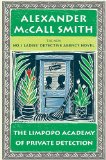
 The Limpopo Academy of Private Detection
The Limpopo Academy of Private DetectionReview posted 12/20/2012.
Pantheon Books, New York, 2012. 257 pages.
Starred Review
Ah, when I finish a No. 1 Ladies' Detective Agency Novel, I feel I've spent some time with my dear friends in Botswana. Never mind that they are fictional!
In this installment, at first I was annoyed with Mma Makutsi. She's feeling a bit grandiose after her marriage to Phuti Radiphuti. But there were soon plenty of things to distract from that. This book was filled with personal troubles that needed to be solved: Mma Potokwane of the orphanage was being dismissed. Fanwell, Mr. J. L. B. Matekoni's former apprentice was arrested. And Phuti Radiphuti and Grace, his new wife, were having a house built. What's more, the detective agency has a very special visitor, a visitor who's been referred to many times, but whom readers have never met before.
Some of the solutions to these problems are not terribly surprising, though we do enjoy the way they play out. One solution was completely unexpected and made me laugh out loud, even in a doctor's waiting room.
I like the customary reflective paragraph at the beginning:
In Botswana, home to the No. 1 Ladies' Detective Agency for the problems of ladies, and others, it is customary -- one might say, very customary -- to enquire of the people whom you meet whether they have slept well. The answer to that question is almost inevitably that they have indeed slept well, even if they have not, and have spent the night tossing and turning as a result of the nocturnal barking of dogs, the activity of mosquitoes or the prickings of a bad conscience. Of course, mosquitoes may be defeated by nets or sprays, just as dogs may be roundly scolded; a bad conscience, though is not so easily stifled. If somebody were to invent a spray capable of dealing with an uncomfortable conscience, that person would undoubtedly do rather well -- but perhaps might not sleep as soundly as before, were he to reflect on the consequences of his invention. Bad consciences, it would appear, are there for a purpose: to make us feel regret over our failings. Should they be silenced, then our entirely human weaknesses, our manifold omissions, would become all the greater -- and that, as Mma Ramotswe would certainly say, is not a good thing.
I felt warm and content when I finished reading this book, and closed it with a smile.
